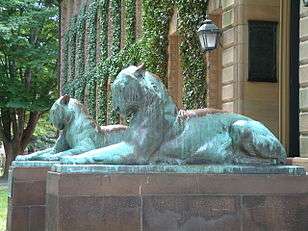Princeton University Department of History
The Princeton University Department of History is an academic department at Princeton University in Princeton, New Jersey. Founded in 1871, the department is one of the leading programs in the country for the study of history. It teaches, offers coursework at the undergraduate and graduate levels, and in research, organizes numerous research initiatives and public events.[3] The department is home to approximately 60 faculty members, many of whom teach courses in other departments as well.[4]
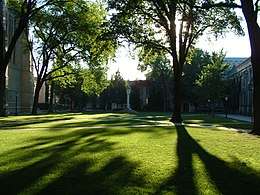 Dickinson Hall, home to the Department of History | |
| Type | Private |
|---|---|
Parent institution | Princeton University |
| Dean | Keith Wailoo |
Academic staff | Approximately 60 faculty members |
| Students | Approximately 200 undergraduate students and 130 graduate students[1][2] |
| Location | , , United States |
| Website | history |
In 2018, U.S. News & World Report ranked the department as No. 1 in the United States, tied with Stanford University and Yale University, while the National Research Council ranked the department as No. 1 in the country for research and scholarship.[5][6] The department's affiliates have also been awarded five Macarthur "Genius Grants" and four Pulitzer Prizes.[7] Notable alumni include two Associate Justices of the Supreme Court of the United States.
History
Initial coursework for the history curriculum began in 1871 with courses on the philosophy of history and political science.[8] The first faculty member to have the title of Professor of History was Charles Woodruff Shields, from 1869 to 1882. Eventual president Woodrow Wilson founded the Department of History, Politics, and Economics in 1904.[9] Winthrop More Daniels became the first chairman of the new Department.
Economics branched off in 1913, Politics in 1924.[10] Interest in the History in the Philosophy of Science emerged in the 1930s, making the now History of Science program one of the oldest in the country.[11] The program was officially established in the 1960s by Professor Charles Coulston Gillispie.
The department launched The Papers of Thomas Jefferson project in December 1943, which aims to prepare the "definitive scholarly edition of the correspondence and papers written by America's author of the Declaration of Independence and third president."[12] As of 2017, the program has published 43 volumes of documents written to or by Thomas Jefferson.[13]
Lawrence Stone, professor at University College and Corpus Christi College (Oxford University) joined the department in 1963 after two years at the Institute for Advanced Study. He served as chairman from 1967 to 1970 and was fundamental in its development as a highly regarded leader in the discipline.[14] The Lawrence Stone Lectures, annual lectures held at the university, are named in his honor. He had previously had an academic dispute with Hugh Trevor-Roper, then Regius Professor of History at Oxford University over the origins of the English Revolution in the "storm over the gentry" debate.[15]
In 1968, Shelby Cullom Davis, Class of '30, gave $5.2 million to the department in order "to assure the continuance of excellence in scholarship and the teaching of history at Princeton University."[16][17] With these funds, the department established the Davis Center for Historical Studies. The center hosts weekly seminars, conferences, and a cohort of postgraduate students each year. In 1969, Nancy Weiss Malkiel became the first woman to join the Department of History.[18] The Davis Center eventually became one of the most innovative and influential centers for historical studies.[19]
Robert Darnton, a historian of eighteenth-century France, joined the department in 1968, having graduated from Harvard in 1960.[20] He, along with anthropologist Clifford Geertz at the Institute for Advanced Study, began to co-teach courses on European "mentalities" that explored the applications of anthropology in history.[21] This relationship culminated in Darnton's 1984 The Great Cat Massacre and Other Episodes in French Cultural History, which offers a new historiographical framework for describing the past.
Natalie Zemon Davis was the Henry Charles Lea Professor of History and director of the Shelby Cullom Davis Center for Historical Studies from 1978 to her retirement in 1996. She taught various courses on early modern France, anthropology, and early modern Jewish history. She related on historical instances of radical events, such as urban riots, youth revolts, and feminism, which reflected contemporary interests.[22] By the 1980s, the department acquired a reputation as the "hot history department".[23]
In 2015, a $5 million gift from John P. Birkelund, Class of '52, established the Program in History and the Practice of Diplomacy at the University. The interdisciplinary program combines coursework in history, politics, and other social sciences in order to aid in preparation "for careers in governmental and nongovernmental organizations (NGOs) that preserve stability and improve lives around the world."[24]
Nine Princeton historians to date have served as president of the American Historical Association: William Milligan Sloane in 1911, Dana Carleton Munro in 1926, Thomas J. Wertenbaker in 1947, Julian P. Boyd in 1964, Robert Roswell Palmer in 1970, and Joseph Strayer in 1971, Gordon A. Craig in 1982, Natalie Zemon Davis in 1987, and Anthony Grafton in 2011.[25][26]
Currently, the department is based in the neo-Gothic Dickinson Hall in Princeton, New Jersey.
Academics
The Department of History offers a diverse array of coursework and opportunities for research. Students are able to take courses in other departments, such as Politics, Classics, East Asian Studies, and the Princeton School of Public and International Affairs. Concentrations are offered in 19 areas:
- Africa
- Colonial / Revolutionary / Early National America
- Early Modern Europe
- East Asia
- Economic
- Environmental
- History of Science
- Latin America and Caribbean
- Legal / Constitutional
- Medieval
- Mediterranean / Ottoman / Middle East
- Modern Europe
- Russia / Eurasia / Eastern Europe
- South Asia / India / Post Colonial
- Southeast Asia
- U.S. 19th Century
- U.S. 20th Century
- Women / Gender / Sexuality
- World / Global / Transnational
Undergraduate
Undergraduate students who concentrate in History can earn an A.B. degree and are able to choose from over forty different undergraduate courses each year.[27][28] Additionally, undergraduates can showcase their research in the biannual publication of the Princeton Historical Review.[29] Like all undergraduates at Princeton, history concentrators are required to complete a senior thesis based on original research. The department awards the Stone/Davis Prize to support archival research away from Princeton for students' senior theses.[30] The Laurence Hutton Prize in History is awarded annually to the department's top student.[31][32]
Graduate
The graduate program in history prepares students for a career as professional researchers and historians. Each year, the department receives approximately 400 applications and enrolls a cohort of 20-25 students each year. Upon passing the requirements of the program, students are offered a Ph.D. in History or a Ph.D. in History of Science. Alumni of the program often progress to careers in academia, including at Harvard University, Yale University, or Stanford University, as well as in law, government, and business.[33] In the 2018-2019 academic year, approximately 8.6% of applicants were accepted into the program.[34] All graduate students are guaranteed full-tuition coverage and a five-year stipend. They also may earn additional funding from Princeton's Assistantships in Research and Assistantships in Instruction programs.
Rankings
The Department of History is ranked consistently as one of the highest ranked institutions for the study of history in the country and in the world.[35][36][37][38] U.S. News & World Report college rankings places the department at No. 1 in the United States.[39] The Chronicle of Higher Education publishes the National Research Council rankings which ranks Princeton as No. 1 on its Research rank; No. 1 on its S-Rank for its scholars; and No. 2 on its R-Rank for its quality based on faculty reviews.[40] The Times Higher Education World University Rankings ranks the department at No. 7 in the world.[41]
Research
The department maintains a number of affiliations with a number of centers and research institutes.
- Shelby Cullom Davis Center[42]
- Global History Lab[43]
- Center for Collaborative History[44]
- Program in History and the Practice of Diplomacy[45]
- Princeton Institute for International and Regional Studies
- Princeton University East Asian Studies Department
- Princeton Center for the Digital Humanities
Shelby Cullom Davis Center
The Davis Center for Historical Studies, known also as the Shelby Cullom Davis Center, is designed to foster research on specific themes and topics through its weekly seminars, conferences, and workshops. Founded in 1869, the center offers a number of professorships and fellowships for leading scholars in the field. Emphasis is placed on an interdisciplinary approach to studying the past in a multitude of geographical areas and periods.[46] Its weekly seminar has been recognized as one of "the most interesting, lively and controversial in the country" due to the "use of cultural anthropology to interpret the past."[47]
Global History Lab
The Global History Lab allows scholars to discuss their research at monthly workshops, take courses in the discipline of global history, and conduct individual research projects with faculty. The program aims "to study the histories of Asia, Africa, Europe and the Americas in international perspectives."[48] The department has also created an edX-run massive open online course (MOOC).[49] The founding director of the Global History Lab is Jeremy Adelman, the Henry Charles Lea Professor of History.
Center for Collaborative History
Founded in 2007, the Center for Collaborative History oversees the history department's working groups, workshops, research projects, and initiatives.[50] It supports research projects, conferences, and symposia hosted by the department. It also coordinates collaborative projects with other academic institutions. Current special projects include the Climate Change and History Research Initiative (CCHRI) and the Public History Working Group.[51]
Notable faculty
Faculty members are known for their scholarly achievements, teaching, and award-winning research. Five faculty members of the Department have won Macarthur "Genius Grants":[52]
- Carl E. Schorske, winner of the MacArthur Fellowship in 1981
- Robert C. Darnton, winner of the MacArthur Fellowship in 1982
- Peter R. L. Brown, winner of the MacArthur Fellowship in 1982
- Emily Thompson, winner of the MacArthur Fellowship in 2005
- Marina Rustow, winner of the MacArthur Fellowship in 2015
Several people associated with the department have also won Pulitzer Prizes:
- Charles Howard McIlwain won the 1924 Pulitzer Prize for History for The American Revolution: A Constitutional Interpretation.
- Carl E. Schorske won the 1981 Pulitzer Prize for General Non-Fiction for Fin-de-siècle Vienna: Politics and Culture.
- Sean Wilentz was a finalist for the 2006 Pulitzer Prize for History for The Rise of American Democracy: Jefferson to Lincoln.
- Wendy Warren was a finalist for the 2017 Pulitzer Prize for History for New England Bound: Slavery and Colonization in Early America.
Additional faculty members include:
- Peter Brown
- David Bell
- L. Carl Brown
- Margot Canaday
- David Cannadine
- Linda Colley
- Angela N. H. Creager
- Jacob Dlamini
- Sheldon Garon
- Michael Gordin
- Anthony Grafton
- Molly Greene
- Jan T. Gross
- Tera Hunter
- Alison Isenberg
- Meg Jacobs
- Harold James
- William Chester Jordan
- Stephen Kotkin
- Kevin Kruse
- Federico Marcon
- James McPherson
- Erika Lorraine Milam
- Philip Nord
- Gyan Prakash
- Theodore Rabb
- Helmut Reimitz
- Marina Rustow
- Martha Sandweiss
- Carl Emil Schorske
- Emily Thompson
- Keith Wailoo
- Sean Wilentz
- Julian Zelizer
Notable alumni
- Dwight W. Anderson, A.B. in History in 1989
- Andrew Bacevich, M.A./Ph.D. in 1982, Professor Emeritus of International Relations and History at the Boston University Frederick S. Pardee School of Global Studies
- James Baker, A.B. in History in 1952, White House Chief of Staff and United States Secretary of the Treasury under President Ronald Reagan, and United States Secretary of State under President George H. W. Bush
- James H. Billington, A.B. in History in 1950, former Librarian of Congress
- Bill Bradley, A.B. in History in 1965
- Alan Brinkley, A.B. in History in 1971, former University Provost and Allan Nevins Professor of History of Columbia University
- Dean Cain, A.B. in History in 1988, American actor and television show host
- Caroline Elkins, A.B. in History in 1991, Professor of History and African and African American Studies at Harvard University
- Lawrence B. Glickman, A.B. in History in 1985, Stephen and Evalyn Milman Professor in American Studies at Cornell University
- Bill Hambrecht, A.B. in History in 1957
- George A. Hirsch, A.B. in History in 1956, founder of the New York City Marathon
- David Hackett Fischer, A.B. in History in 1958, University Professor and Earl Warren Professor of History at Brandeis University
- Steve Forbes, A.B. in History in 1970, Editor-in-Chief of Forbes
- Charles Garside, A.B. in History in 1923, President of the State University of New York
- Wyc Grousbeck, A.B. in History in 1983, lead owner and governor of the Boston Celtics
- Elena Kagan, A.B. in History in 1981, Associate Justice of the Supreme Court of the United States
- Thomas Kean, A.B. in History in 1957, 48th Governor of New Jersey
- George F. Kennan, A.B. in History in 1925, U.S. Ambassador to the Soviet Union
- David D. Kirkpatrick, A.B. in History and American Studies in 1992, report for The New York Times and Cairo Bureau Chief
- Philip Kitcher, M.A./Ph.D. in History and Philosophy of Science in 1974, Professor of Philosophy at Columbia University
- Alexandra Lebenthal, A.B. in History in 1986
- Walter Licht, M.A./Ph.D. in History, Walter H. Annenberg Professor of History at the University of Pennsylvania
- Lewis Lukens, A.B. in History in 1986, Deputy Chief of Mission of the United States Embassy in London
- John Matteson, A.B. in History in 1983
- Claiborne Pell, A.B. in History in 1940, United States Senator from Rhode Island
- Ramesh Ponnuru, A.B. in History in 1995, Senior Editor for the National Review and Fellow at the American Enterprise Institute
- Daniel J. Porter, A.B. in History in 1988, first President of Teach For America
- David Rieff, A.B. in History in 1978
- J. Stapleton Roy, A.B. in History in 1956, former United States Ambassador to China
- Peter Sahlins, M.A./Ph.D. in History in 1986, Professor of History at the University of California Berkeley
- Sonia Sotomayor, A.B. in History in 1976, Associate Justice of the Supreme Court of the United States
- Joey Thieman, American soccer midfielder
- Marie L. Yovanovitch, A.B. in History and Russian Studies in 1980, United States Ambassador to Ukraine
.jpg) James Baker, A.B., 1952
James Baker, A.B., 1952.jpg) Steve Forbes, A.B., 1970
Steve Forbes, A.B., 1970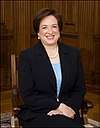 Elena Kagan, A.B., 1981
Elena Kagan, A.B., 1981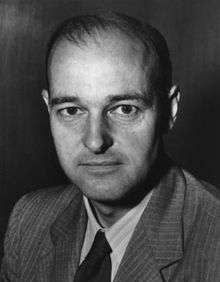 George F. Kennan, A.B., 1925
George F. Kennan, A.B., 1925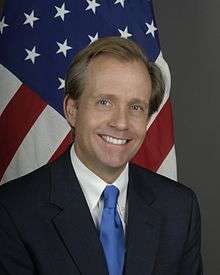 Lewis Lukens, A.B., 1986
Lewis Lukens, A.B., 1986 Sonia Sotomayor, A.B., 1976
Sonia Sotomayor, A.B., 1976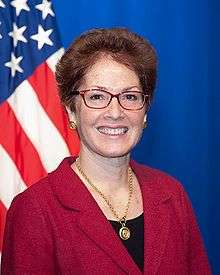 Marie L. Yovanovitch, A.B., 1980
Marie L. Yovanovitch, A.B., 1980
See also
- Princeton University Graduate School
- Princeton University Department of Chemistry
- Princeton University Department of East Asian Studies
- Princeton University Department of Economics
- Princeton University Department of Mathematics
- Princeton University Department of Psychology
- Harvard University Department of History
- Cornell University Department of History
- UC Berkeley Department of History
References
- "Enrollment Statistics". Princeton University.
- "University Enrollment Statistics". Princeton University.
- "Princeton University: Department of History".
- "About". Princeton University Department of History.
- "Best Graduate History Programs". U.S. News & World Report.
- "Doctoral Programs by the Numbers". The Chronicle of Higher Education.
- Silk, Mark. "The Hot History Department". The New York Times.
- Leitch, Alexander. "The Department of History". A Princeton Companion. Archived from the original on 2016-03-05. Retrieved 2018-05-17.
- Leitch, Alexander. "The Department of History". A Princeton Companion.
- Leitch, Alexander. "The Department of History". A Princeton Companion.
- Leitch, Alexander. "Program in History and Philosophy of Science,". A Princeton Companion.
- "Home". The Papers of Thomas Jefferson.
- "Our Volumes". The Papers of Thomas Jefferson.
- "Lawrence Stone, 79, Historian Of the Changing Social Order". The New York Times.
- Silk, Mark. "The Hot History Department". The New York Times.
- Leitch, Alexander. "A Princeton Companion".
- "The Davis Center for Historical Studies".
- "Nancy Weiss Malkiel Junior Faculty Fellows Announced". The Woodrow Wilson National Fellowship Foundation.
- "Stone, Lawrence". Oxford Dictionary of National Biography.
- "Robert Darnton | Department of History". history.princeton.edu. Retrieved 2020-03-03.
- Silk, Mark. "The Hot History Department". The New York Times.
- Silk, Mark. "The Hot History Department". The New York Times.
- Silk, Mark. "The Hot History Department". The New York Times.
- "Birkelund gift funds new certificate program in history and diplomacy; Kotkin, Mullen to co-direct". Princeton University.
- Leitch, Alexander. "The Department of History". A Princeton Companion.
- "Birkelund Gift Funds New Certificate Program in History and Diplomacy; Kotkin and Mullen to Co-direct". History and the Practice of Diplomacy.
- "Undergraduate".
- "Undergraduate Courses".
- "Princeton Historical Review".
- "Stone/Davis Prize". Princeton University Department of History.
- "The Laurence Hutton Prize Fund," The Caledonian (April 1915), p. 152.
- "2018 History Honors and Prizes". Princeton University Department of History.
- "Placement Upon Graduation".
- "Admission Statistics". Princeton University, Graduate School.
- "USA Today".
- "QS World University Rankings by Subject 2016 - History".
- "2018 Best History Colleges in the U.S."
- "Graduate Program Rankings".
- "Best Graduate History Programs". U.S. News and World Report.
- "Doctoral Programs by the Numbers". The Chronicle of Higher Education.
- "World University Rankings 2018 by subject: arts and humanities".
- "Shelby Cullom Davis Center".
- "Global History Lab".
- "Center for Collaborative History".
- "Birkelund gift funds new certificate program in history and diplomacy; Kotkin, Mullen to co-direct". Princeton University.
- "Shelby Cullom Davis Center". Princeton University Department of History.
- Silk, Mark. "The Hot History Department". The New York Times.
- "Global History Lab".
- "Global History Lab". edX.
- "Center for Collaborative History". Princeton University History Department.
- "Special Projects". Princeton University Department of History.
- Silk, Mark. "The Hot History Department". The New York Times.
